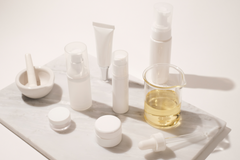How to Lower Blood Pressure Naturally: 15 Science-Backed Methods

High blood pressure (hypertension) affects nearly half of American adults and increases the risk of heart disease, stroke, and other serious health conditions. Often called the "silent killer," hypertension can damage your blood vessels, heart, and other organs without causing noticeable symptoms.
The good news? You don't always need prescription medications to get your numbers under control. Natural approaches can be remarkably effective, especially when combined thoughtfully.
In this comprehensive guide, we'll explore 15 science-backed methods to lower your blood pressure naturally. Whether you're hoping to avoid medication or looking to complement your current treatment plan, these strategies can help you take control of your cardiovascular health.
Understanding Blood Pressure
Before diving into solutions, it's important to understand what we're measuring. Blood pressure readings consist of two numbers:
-
Systolic pressure (the top number): The force exerted against artery walls when your heart beats
-
Diastolic pressure (the bottom number): The pressure between heartbeats when your heart is resting
According to the American Heart Association, normal blood pressure is less than 120/80 mm Hg. Readings between 120–129 systolic with less than 80 diastolic indicate elevated blood pressure. Stage 1 hypertension starts at 130–139 systolic or 80–89 diastolic, while stage 2 hypertension begins at 140/90 mm Hg or higher.
Left unchecked, high blood pressure increases your risk of heart attack, stroke, kidney failure, and numerous other serious health conditions. That's why taking action matters—even modest reductions in blood pressure can significantly lower your risk of cardiovascular events.
Dietary Changes That Lower Blood Pressure
1. Adopt the DASH Diet
The Dietary Approaches to Stop Hypertension (DASH) diet was specifically developed to lower blood pressure without medication. Research shows it can reduce systolic pressure by up to 11 points in people with hypertension.
DASH emphasizes:
-
Plenty of fruits and vegetables
-
Whole grains
-
Lean proteins like poultry and fish
-
Beans, nuts, and seeds (we recommend sprouted)
-
Limited added sugars
A sample day might include oatmeal with berries for breakfast, a quinoa salad with vegetables for lunch, and baked fish with roasted vegetables for dinner. The DASH diet works because it provides a balanced approach to nutrients that affect blood pressure, particularly potassium, calcium, and magnesium.
2. Reduce Sodium Intake
Most Americans consume far more sodium than recommended—often without realizing it. Excess sodium causes your body to retain water, increasing blood volume and pressure.
To reduce sodium:
-
Read food labels
-
Cook at home more often using fresh ingredients
-
Rinse canned foods to remove excess sodium
-
Use herbs, spices, and salt-free seasonings instead of salt
-
Be cautious with condiments like soy sauce, salad dressings, and processed sauces
Even reducing sodium moderately can lower systolic pressure by 2–8 mm Hg in many people with hypertension.
3. Increase Potassium-Rich Foods
Potassium helps counterbalance sodium's effects by promoting sodium excretion through urine. It also helps relax blood vessel walls.
Excellent sources include:
-
Bananas
-
Sweet potatoes
-
Spinach and other leafy greens
-
Avocados
-
Beans and lentils (we recommend sprouted)
-
Cantaloupe and oranges
However, too much potassium can be harmful for people with kidney disease or those taking certain medications. Consult your healthcare provider before significantly increasing your potassium intake.
4. Add Heart-Healthy Foods
Certain foods have particularly beneficial effects on blood pressure beyond their basic nutritional value:
-
Berries: Rich in antioxidants that improve blood vessel function and reduce inflammation
-
Beets: Contain nitrates that help relax blood vessels and improve blood flow
-
Fatty fish: Salmon, mackerel, and other omega-3 rich fish help reduce inflammation and lower blood pressure
-
Dark chocolate: In moderation (70%+ cocoa content), can improve blood vessel elasticity
-
Organ meats, particularly heart, are another powerful addition to a heart-healthy diet. Our Grass Fed Beef Heart supplement provides concentrated nutrients that support cardiovascular health, including CoQ10, B vitamins, and iron. These nutrients help maintain healthy blood pressure levels by supporting proper energy production in the heart muscle and maintaining the integrity of blood vessels. Just one serving daily provides natural cardiovascular support while complementing the other dietary changes mentioned here.
Lifestyle Modifications for Better Blood Pressure
5. Regular Physical Activity
Exercise strengthens your heart so it can pump blood more efficiently, reducing the pressure on your arteries. Aim for at least 150 minutes of moderate activity weekly, such as:
-
Brisk walking
-
Swimming
-
Cycling
-
Dancing
-
Household chores that get your heart pumping
Even without weight loss, regular exercise can reduce systolic blood pressure by about 5–8 mm Hg. Start slowly if you've been inactive, and consider checking with your doctor before beginning a new exercise regimen.
6. Achieve and Maintain a Healthy Weight
Blood pressure often rises as weight increases. Even modest weight loss—just 5–10% of your current weight—can significantly reduce blood pressure.
7. Limit Alcohol Consumption
While some studies suggest very small amounts of alcohol might benefit heart health, the evidence increasingly points toward limiting intake for better blood pressure.
The American Heart Association recommends:
-
Men: No more than two drinks daily
-
Women: No more than one drink daily
One drink equals 12 oz beer, 5 oz wine, or 1.5 oz liquor.
8. Quit Smoking
Every cigarette temporarily raises your blood pressure, damages blood vessel walls, and reduces their elasticity. While smoking doesn't cause chronic hypertension directly, it significantly increases your risk of heart disease.
The good news is that your blood pressure begins to improve within minutes of quitting, and your risk of heart disease starts dropping within a day. Within a year of quitting, your risk of heart disease drops by half.
Stress Management Techniques
9. Practice Mindfulness Meditation
Chronic stress contributes to high blood pressure by triggering hormonal changes and unhealthy coping behaviors. Mindfulness meditation counteracts these effects by activating your body's relaxation response.
To start:
-
Find a quiet place
-
Sit comfortably with good posture
-
Focus on your breath
-
When your mind wanders, gently bring attention back to breathing
-
Start with 5 minutes daily, gradually increasing to 15–20 minutes
10. Try Deep Breathing Exercises
Slow, deep breathing activates the parasympathetic nervous system, which helps lower blood pressure. One effective technique is 4-7-8 breathing:
-
Inhale quietly through your nose for 4 seconds
-
Hold your breath for 7 seconds
-
Exhale completely through your mouth for 8 seconds
-
Repeat 3–4 times, twice daily
A daily practice of just 5–10 minutes can significantly reduce blood pressure over time.
11. Get Adequate Sleep
Poor sleep quality and duration are linked to higher blood pressure. During normal sleep, blood pressure drops by 10–20%—a phenomenon called "nocturnal dipping." Without sufficient quality sleep, this natural dip may not occur.
Aim for 7–9 hours of quality sleep nightly by:
-
Maintaining a consistent sleep schedule
-
Creating a relaxing bedtime routine
-
Keeping your bedroom cool, dark, and quiet
-
Limiting screen time before bed
-
Avoiding caffeine and alcohol near bedtime
If you snore loudly or feel chronically tired despite adequate sleep, consider being evaluated for sleep apnea, which significantly increases hypertension risk.
Beneficial Supplements and Natural Remedies
12. Consider These Evidence-Based Supplements
Several supplements show promise for supporting healthy blood pressure:
-
Hibiscus tea: May help lower systolic pressure
-
Magnesium: Helps regulate blood pressure by relaxing blood vessels
-
CoQ10: Supports heart function and energy production
-
Grass Fed Beef Heart is particularly valuable here, as it's naturally rich in CoQ10, an essential nutrient for heart health that tends to be depleted in people with hypertension. Unlike synthetic supplements, our Grass Fed Beef Heart provides CoQ10 in its natural form alongside complementary nutrients that enhance absorption and effectiveness. This whole-food approach supports not just blood pressure but overall cardiovascular function.
13. Herbs That May Help
Several herbs show promising effects on blood pressure:
-
Cinnamon: May improve insulin sensitivity and blood vessel function
-
Basil: Contains eugenol, which acts as a natural calcium channel blocker
-
Celery seed: Contains compounds that may help relax blood vessels
-
Ginger: Has anti-inflammatory effects that support cardiovascular health
These can be incorporated into your cooking or taken as teas. Always discuss herbal remedies with your healthcare provider, especially if you take medication.
Tracking Progress and Setting Goals
14. Home Blood Pressure Monitoring
Monitoring your blood pressure at home provides valuable feedback on how your lifestyle changes are working. For accurate readings:
-
Use a validated upper-arm monitor (wrist monitors are generally less accurate)
-
Measure at the same time each day
-
Sit with your back supported and feet flat on the floor
-
Rest your arm at heart level on a table
-
Don't talk during measurement
-
Take 2–3 readings one minute apart and record the average
Keep a log to identify patterns and share with your healthcare provider.
15. Creating a Sustainable Plan
The most effective approach combines multiple strategies tailored to your preferences and lifestyle. Rather than trying to implement everything at once:
-
Start with 2–3 changes you're most confident you can maintain
-
Set specific, measurable goals (e.g., "walk 30 minutes 5 days weekly" rather than "exercise more")
-
Track your progress using a journal or app
-
Add new strategies gradually as initial changes become habits
-
Celebrate improvements in your blood pressure readings
Remember that consistency matters more than perfection. Even modest improvements maintained over time yield significant health benefits.
When to Seek Medical Help
While natural approaches are powerful, they're not always sufficient alone. Contact your doctor immediately if you experience:
-
Blood pressure readings over 180/120 mm Hg
-
Severe headache or nosebleed with high readings
-
Shortness of breath
-
Visual changes
-
Chest pain
Continue regular checkups even as you implement natural strategies. Some people will still need medication despite their best efforts, and that's perfectly okay. Natural approaches can complement medication, potentially allowing lower doses.
Conclusion
Lowering your blood pressure naturally requires consistency and patience, but the rewards—reduced medication dependency and better overall health—are well worth the effort. By combining dietary changes like the DASH diet with regular physical activity, stress management, and targeted supplements like our Grass Fed Beef Heart, you can take meaningful control of your cardiovascular health.
Remember that small, sustainable changes add up to significant results over time. Focus on progress rather than perfection, and work closely with your healthcare provider to monitor your improvements.
Frequently Asked Questions
Can natural methods replace blood pressure medication?
For some people with mild to moderate hypertension, natural methods may be sufficient. However, never stop taking prescribed medication without consulting your doctor. Many people successfully reduce their medication needs through lifestyle changes while remaining under medical supervision.
How quickly will these changes lower my blood pressure?
Some changes, like reducing sodium and practicing deep breathing, can affect blood pressure within days. Others, like weight loss and regular exercise, may take weeks or months to show their full effect. Consistency is key.
Are there any natural methods that work immediately?
Deep breathing exercises and meditation can temporarily lower blood pressure within minutes. However, sustainable reduction requires consistent effort over time.
Which single method is most effective for lowering blood pressure?
No single approach works best for everyone. The DASH diet combined with regular exercise typically yields the most significant results, but the most effective strategy is combining multiple approaches tailored to your individual needs.
Can stress really cause high blood pressure?
Chronic stress contributes to high blood pressure by triggering hormonal changes that increase heart rate and constrict blood vessels. While it might not cause permanent hypertension alone, managing stress is crucial for maintaining healthy blood pressure.
Is it possible to have normal blood pressure without medication?
Yes, many people maintain normal blood pressure through lifestyle measures alone. Even those with a genetic predisposition to hypertension can often delay or reduce their need for medication through the natural approaches outlined in this article.
Disclaimer: This article is for informational purposes only and is not a substitute for professional medical advice. Always consult with a healthcare provider before making changes to your health regimen, especially if you have been prescribed medication for high blood pressure.











